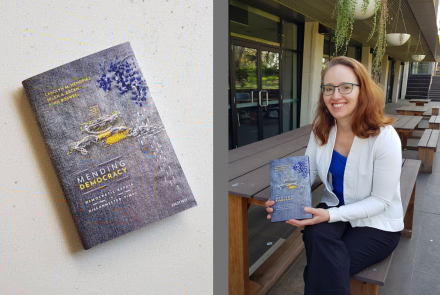
Mending our threadbare democracies
Democracy is plagued with disconnection, but by working with the everyday efforts to mend our systems from within, democracies can achieve renewal without re-inventing the wheel, Carolyn Hendriks, Selen Ercan, and John Boswell write.
For many, 2020 will be remembered as a year of isolation and disconnection. COVID-19 has created all sorts of disconnection, whether it be among families, friends, workplaces, or whole communities.
But society is also suffering from a wider set of disconnections that long pre-date the pandemic.
Surveys around the globe reveal that many people feel profoundly disconnected from their democratic systems – the institutions through which societies make legitimate collective decisions.
In our new book, Mending Democracy, we argue modern democracies are being worn thin through a range of disconnections. Ordinary people are disconnected from their elected representatives, politically polarised, and unable to relate to large complex systems of modern governance.
We contend that these disconnections are weakening the integrity of democracy.
So, what practical steps can be taken to mend them?
Unfortunately, current approaches to democratic renewal fall short in addressing widespread disconnection. Most reform initiatives are procedural or institutional. They involve changing formal rules, such as electoral systems, or coupling new institutions with old ones, like using a citizens’ assembly in a legislative context.
These ‘patches’ might help repair isolated institutional problems, but they often do little to strengthen the broader integrity of democracy.
Instead, a different approach to democratic repair is needed, which we call ‘democratic mending’. Democratic mending focuses on strengthening connections in weak parts of the democratic system. It does this with incremental, small-scale, everyday work that can enhance and reimagine the democratic institutions and practices as they are, rather than by seeking to re-invent them.
The idea of democratic mending emerged from over a decade of research studying the experiences and efforts of everyday people trying to improve their democratic experiences. When we looked closely at what some actors are doing in the face of democratic disconnection, we found enormous resourcefulness and ingenuity.
The book uncovers how everyday citizens, community groups, public administrators, and politicians are taking practical and creative steps to strengthen and make democracy work. They work with existing democratic institutions and political practices and seek to innovate and change them from within. They mend and make do.
The book offers various examples of democratic mending at work both within and outside of the institutions of representative democracy. For example, we examined a grassroots effort by disaffected constituents in the federal electorate of Indi in regional Victoria, Australia, to improve listening, communication, and responsiveness in the representative process.
We also studied how a group of everyday citizens formed a playful protest group, the Knitting Nannas Against Gas, to oppose coal seam gas development in New South Wales and how they used colour, craft, and creative participation to form connections with the public sphere.
In addition, we explored the ways in which public administrators and patient activists enhanced public input and scrutiny along a tangled policy process in the United Kingdom’s healthcare system.
In all these cases, the actors were not withdrawing, resisting, or seeking autonomy from representative democracy, but actively experimenting with ways to engage with it and improve its outcomes.
Democratic mending is not a quick-fix approach to renewing democracy, but one that requires significant effort over time. It relies on the goodwill and enthusiasm of everyday people to adopt and push a range of everyday mending practices that make, re-make, and sustain democratic connections.
Democratic menders give good reason for hope, not because they have thrown out existing institutions or identified a universal repair kit, but because they demonstrate an emerging approach to repair. These connective practices develop in context.
They emerge through the agency, creativity, and practical effort of diverse actors working to mend the democratic disconnection they encounter.
Now is the time to support and participate in local, small-scale efforts to strengthen the integrity of democracy, and all those passionate about democratic reform should embrace six key principles of democratic mending.
First, to drive democratic reform with actors. Democratic reform is something everyone can and should play a role in, and where possible, policymakers should be involved in supporting existing bottom-up approaches to democratic action, rather than imposing democratic innovation from above.
Second, to make democratic reform fun. Creativity, socialisation, and enjoyment are central to all these examples of democratic mending. After all, it is easier to get everyday actors to engage if it is fun and rewarding.
Third, make democratic reform meaningful. It is much easier to engage everyday political actors on the things they care about – their local community, or the issues that affect them most, but equally important is that they feel confident that their contributions matter.
Fourth, make democratic reform last. The value of innovating within existing institutions and practices is tied to whether those innovations have staying power.
Fifth, make democratic reform with the resources available. Our research showcases the ingenuity and resourcefulness of everyday actors to reimagine existing political institutions, and their example should be followed.
Finally, make democratic reform experimental. Democratic experimentation should be akin to everyday trial-and-error.
If those passionate about democratic reform engage in democratic mending along these lines, and identify and support innovative efforts to repair democracy from within, there is hope for serious democratic renewal into the future.
This piece was first published on Policy Forum and Pop Politics.
Updated: 14 July 2024/Responsible Officer: Crawford Engagement/Page Contact: CAP Web Team













